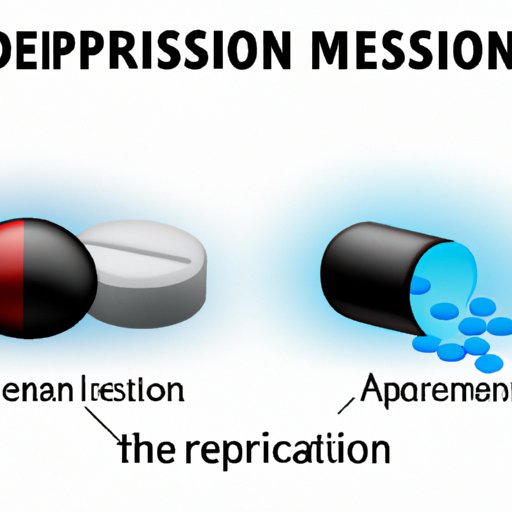Demystifying Depression Medication: Unlocking the Science Behind its Function
Depression is a complex mental health condition that affects millions of people worldwide. While there are various treatment options available, medication is often a crucial component in managing depressive symptoms. However, many individuals have misconceptions about depression medication. In this article, we will delve into the science behind depression medication, exploring how it works and dispelling common misconceptions. By understanding the mechanisms at play, we can gain a clearer picture of how depression medication can be an effective tool in the treatment of depression.
A Comprehensive Guide to Understanding How Depression Medication Works
Before we delve into the science behind depression medication, it is essential to understand the role of neurotransmitters in regulating our mood. Neurotransmitters, such as serotonin, norepinephrine, and dopamine, are chemicals involved in transmitting signals in the brain. An imbalance or dysfunction in these neurotransmitters can contribute to the development of depression.
There are various classes of depression medication that work by targeting specific neurotransmitters in the brain. Selective serotonin reuptake inhibitors (SSRIs) are one of the most commonly prescribed types of antidepressants. SSRIs work by blocking the reabsorption of serotonin, increasing its availability in the brain. This increased serotonin level helps regulate mood and alleviate depressive symptoms.
Depression medication does not solely rely on increasing serotonin levels. Other classes of medications, such as selective norepinephrine reuptake inhibitors (SNRIs) and atypical antidepressants, work by targeting different neurotransmitters. SNRIs increase the availability of both serotonin and norepinephrine, while atypical antidepressants have varying effects on different neurotransmitters. This diverse array of medications allows for tailored treatment based on the individual’s specific needs and symptoms.
Exploring the Mechanisms: How Exactly Does Depression Medication Treat the Symptoms?
Depression medication primarily works by influencing the levels and activity of neurotransmitters. Serotonin, in particular, plays a vital role in regulating mood, sleep, and appetite. By increasing the concentration of serotonin in the brain, depression medication helps restore balance and improve depressive symptoms.
Additionally, depression medication can also impact other neurotransmitters, such as norepinephrine and dopamine. Norepinephrine is involved in the body’s stress response and emotional regulation, while dopamine is associated with motivation and pleasure. By targeting these neurotransmitters, depression medication can have a comprehensive effect on mood regulation and overall well-being.
Understanding the Chemistry: The Science Behind Depression Medication
A key process involved in depression medication is reuptake inhibition. Reuptake is the process by which neurotransmitters are taken back into the nerve cells after being released. Depression medication, particularly SSRIs, inhibits the reuptake of serotonin. This inhibition allows more serotonin to remain in the synaptic cleft, the gap between nerve cells, increasing its concentration and enhancing its effects on mood.
Selective serotonin reuptake inhibitors (SSRIs) specifically target serotonin reuptake, making more serotonin available for interaction with receptors. This interaction can lead to the alleviation of depressive symptoms, as serotonin’s regulation of mood is restored.
Other chemical processes are also involved. For instance, atypical antidepressants may influence dopamine and norepinephrine levels through various mechanisms. By targeting multiple neurotransmitters, depression medication can provide a broader range of effects, catering to the individual’s specific symptoms and needs.
From Chemical Imbalance to Relief: Unraveling the Mystery of Depression Medication
Chemical imbalances in the brain are commonly associated with depression. These imbalances disrupt normal brain function and contribute to the development of depressive symptoms. Depression medication plays a crucial role in restoring balance to these neurotransmitters, alleviating symptoms, and providing relief.
By targeting the underlying chemical imbalances, depression medication can help rebalance neurotransmitter levels and improve mood regulation. This process allows individuals to experience relief from their depressive symptoms and regain a sense of well-being. It is important to note that depression medication is not a magical cure, but rather a tool that can assist individuals in managing their symptoms and supporting their overall mental health.
Furthermore, seeking professional guidance and individualized treatment is crucial when considering depression medication. A healthcare professional can provide a comprehensive evaluation, consider personal medical history, and tailor a medication plan to suit the individual’s needs. Implementing therapy and lifestyle changes alongside medication can enhance the effectiveness of treatment.
Decoding Antidepressants: A Closer Look at How They Impact Brain Chemistry
Antidepressants have specific effects on brain chemistry that contribute to their efficacy in treating depression. One of these effects is neuroplasticity, the brain’s ability to reorganize and form new connections. Depression medication has been found to promote neuroplasticity, potentially leading to long-term improvements in depressive symptoms.
However, it is essential to be aware of potential side effects and considerations associated with depression medication. These can vary between individuals and medications. Side effects may include changes in appetite, sleep disturbances, or sexual dysfunction. It is crucial to discuss these potential side effects with a healthcare professional to ensure a balanced approach to treatment.
Conclusion
Depression medication plays a significant role in managing depressive symptoms by targeting neurotransmitter imbalances in the brain. By understanding the scientific basis of depression medication, we can overcome common misconceptions and appreciate the effectiveness of these medications. It is crucial to seek professional guidance and individualized treatment when considering depression medication. Additionally, a holistic approach that includes therapy, lifestyle changes, and a strong support system can enhance the overall effectiveness of treatment. By embracing hope and understanding, individuals can navigate their journey to improved mental health with confidence.
(Note: Is this article not meeting your expectations? Do you have knowledge or insights to share? Unlock new opportunities and expand your reach by joining our authors team. Click Registration to join us and share your expertise with our readers.)
